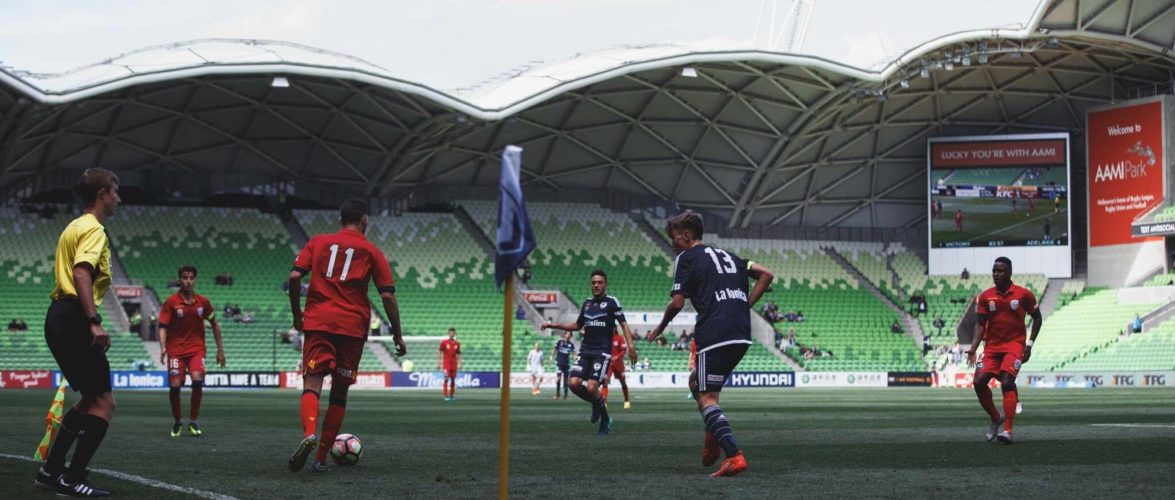Image: Matt Johnson
As 2017 commences, the engine rooms throughout all clubs are full steam ahead organising their busy schedule, with a focus on the FFA cup and competitive season, but should this be the main focus as a measurement of club success? I think not.
Similar to the process of a car built on an assembly line, aspiring youth players need to be pieced together in an environment where they can be nurtured and taught the fundamentals of the game. This can be achieved through well-tailored development systems that enable young players to be moulded and advanced through the ranks of one club accordingly. This alone will empower the club to be branded a ‘haven for producing outstanding players’.
Unfortunately, the current theme is similar to that of a ‘recycling plant’, where youth players are in a constant cycle of changing clubs every year, with the most common reasons including not getting enough game time, parents and coaches quarreling, egos getting involved, favouritism, or everyone thinking they are an expert of the game.
These themes are all placed above the child’s wellbeing and development, which unfortunately is at the child’s expense in the long run. Think about what you see or do at your child’s game … parents putting their child on a pedestal, feeding their thoughts that they are the best no matter what, parents abusing children, children developing a fear of failure instead of accepting that this alone is a stepping stone to succeed.
We mask the fun factor and enjoyment of the game, which often leads to a disinterested and unmotivated child. How can you not see that you are crippling your child of important life lessons such as accepting the fact that you cannot make your child successful in the real world; or make your child believe that failure is seen as a bad thing instead of a hurdle that can be jumped; or that success is a direct result of working hard.
Why do you think Australian parents send their kids overseas at a young age to academies? There’s no babying your child every time they don’t succeed, you are taught to fail quickly and then accomplish through hard work. No parents can get in the coach’s ear, there are no favourites and, most importantly, coaches are well educated alongside a highly trained team that specialise in different areas to develop your child into a highly functioning athlete. These are the basic concepts we seem to ignore here in Australia, yet wonder why we are falling behind in football development compared to other nations.
Over the next five years, there will be major internal changes at club level, across all tiers, which are aimed at making us a football powerhouse in 10-15 years time. Some progressive football clubs (both NPL and state leagues) and academies will either be recognised for their expertise in player development from a grassroots level to senior football. Others will slowly fade away into the background for their lack of foresight and progressive development. There is an emerging theme that is now coming to light which should’ve been implemented 15 years ago, and this is the introduction of employing specialists (exercise scientists, exercise physiologists, psychologists, dieticians and naturopaths) to nurture the development of both youth players and senior players to enhance the chances of success on a world scale.
Please be aware that this is not focused only on the financially stable clubs/academies within Victoria, but even small family clubs that are aiming to become a well-structured foundation for player development. Some essential protocols include data analysis (individual and team performances), medical pre-screenings, strength and conditioning (for juniors and seniors), motor learning, balance\coordination, injury prevention (pre-habilitation) programs, and regular educational workshops, which are all small investments that over time will multiply into positive outcomes for all parties involved.
Currently Australian football development is not up to the level with football clubs overseas, but why? Because we are on a hamster wheel that is controlled by poorly informed people in control of our game. Our lack of education and understanding of brain development, physiology, human anatomy, energy systems and nutrition is the start of this downward spiral, not because we don’t have access to implement this into the football stream, but because we are ignorant and unaware of the benefits associated with a strong foundation of meaningful training and education.
What we have in Australia is this: one coach who is given the responsibility and expectation to mould a Messi or Ronaldo, despite only having the qualification to implement training drills and tactics. Would you ask a bricky to design your house? No, so why expect a coach to understand complex brain development mastery, proprioception, motor learning deficiencies, gait pattern corrections, posture deficiencies,or weak musculature for example?
Now I am not here to have a dig at our coaches, but rather highlight the fact they cannot possibly teach young players these complex training techniques if they do not have the necessary qualifications and expertise to do so. Overseas, we have university qualified specialists who either are employed\volunteer at academies\clubs to develop, identify, and implement these systems, and have direct input into educating coaches, training schedule programming and systematic player analysis.
These are the prime years that a footballer’s mind should have a deepened understanding and knowledge of the game and human body. Don’t be fooled by their young underdeveloped bodies, their minds are starving to learn and grow. The icons of our game accumulated thousands of hours of meaningful practice by the age of 10, and we label them as a ‘wonder-child’ or ‘gifted’, instead of recognising them for their hard work guided by specialists of the game.
Instead we try force our A-league youth players to become great players, who for good reason are thrown back into the NPL or lower leagues because they are not taught the correct fundamentals of the game. So what happens? We hunt for players overseas who are either exposed to better training or are mature aged players. When children are exposed to these environments at a young age, like overseas Arsenal or Barcelona youth academies, they are provided with the ingredients to develop into outstanding players because they will be miles ahead of the pack before their adolescent years. YouTube their training so you can actually see for your own eyes why we fail.
So how do we achieve this? The first step is to educate yourself, your club’s board members, your coaches and your children, because the more you know, the more you realise what you don’t know.
Walking Tall are running workshops which can be presented to your board members, coaches, players and parents so that platforms and services can be available to those who are not turning the blind eye to the importance of this much-needed change.

